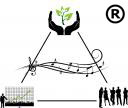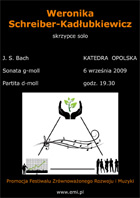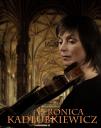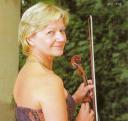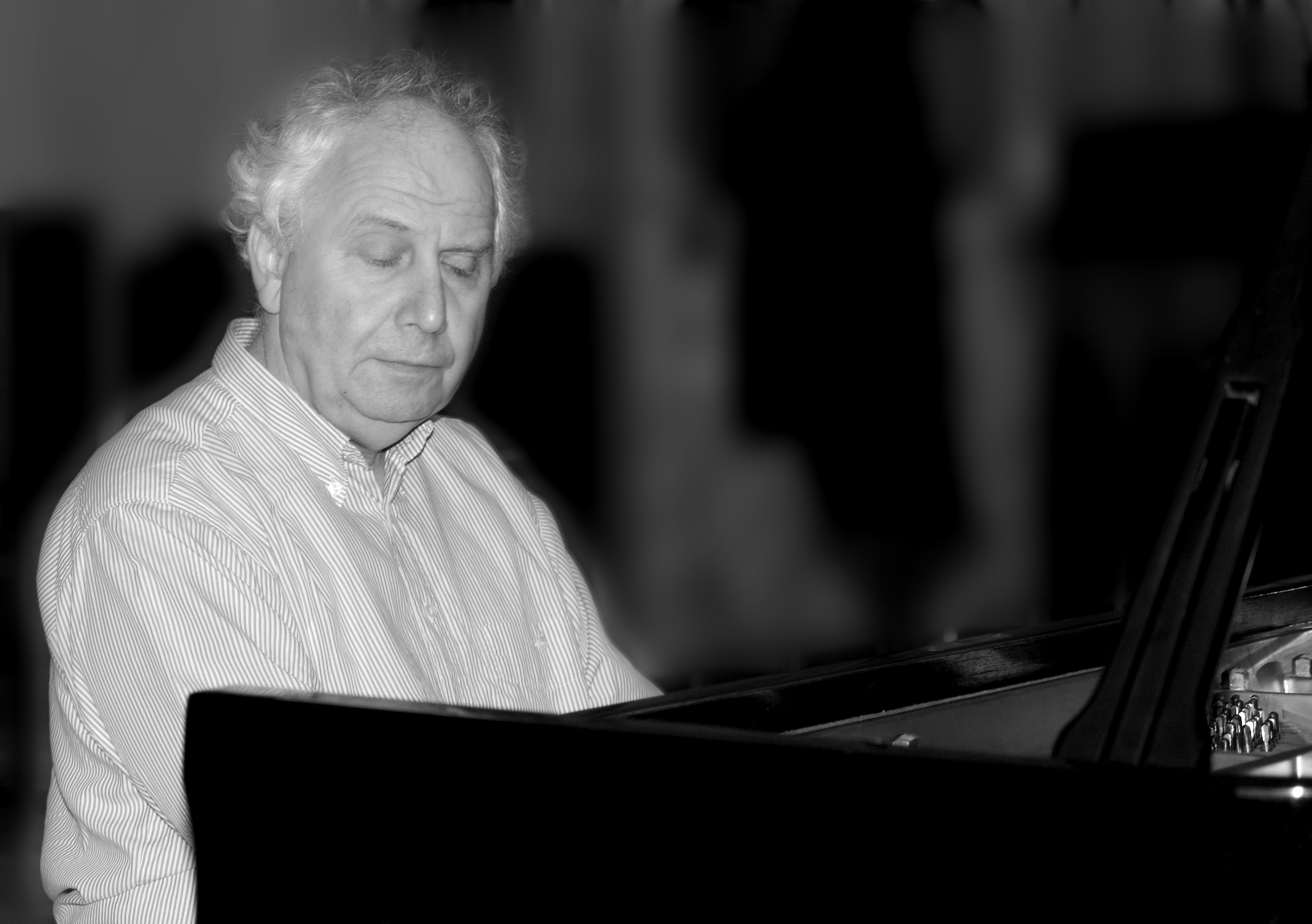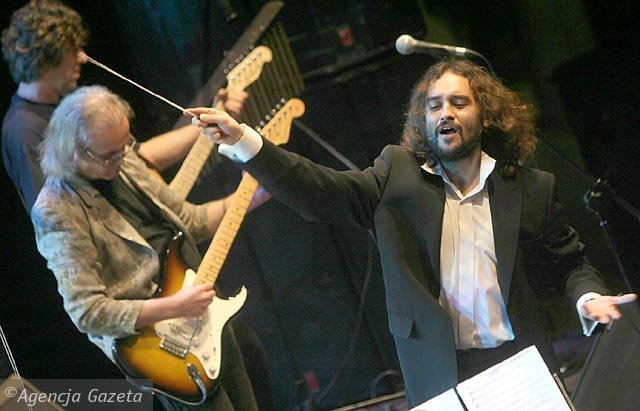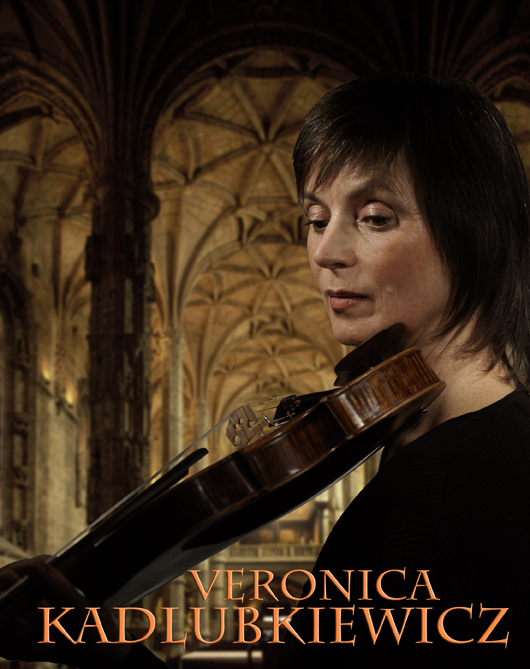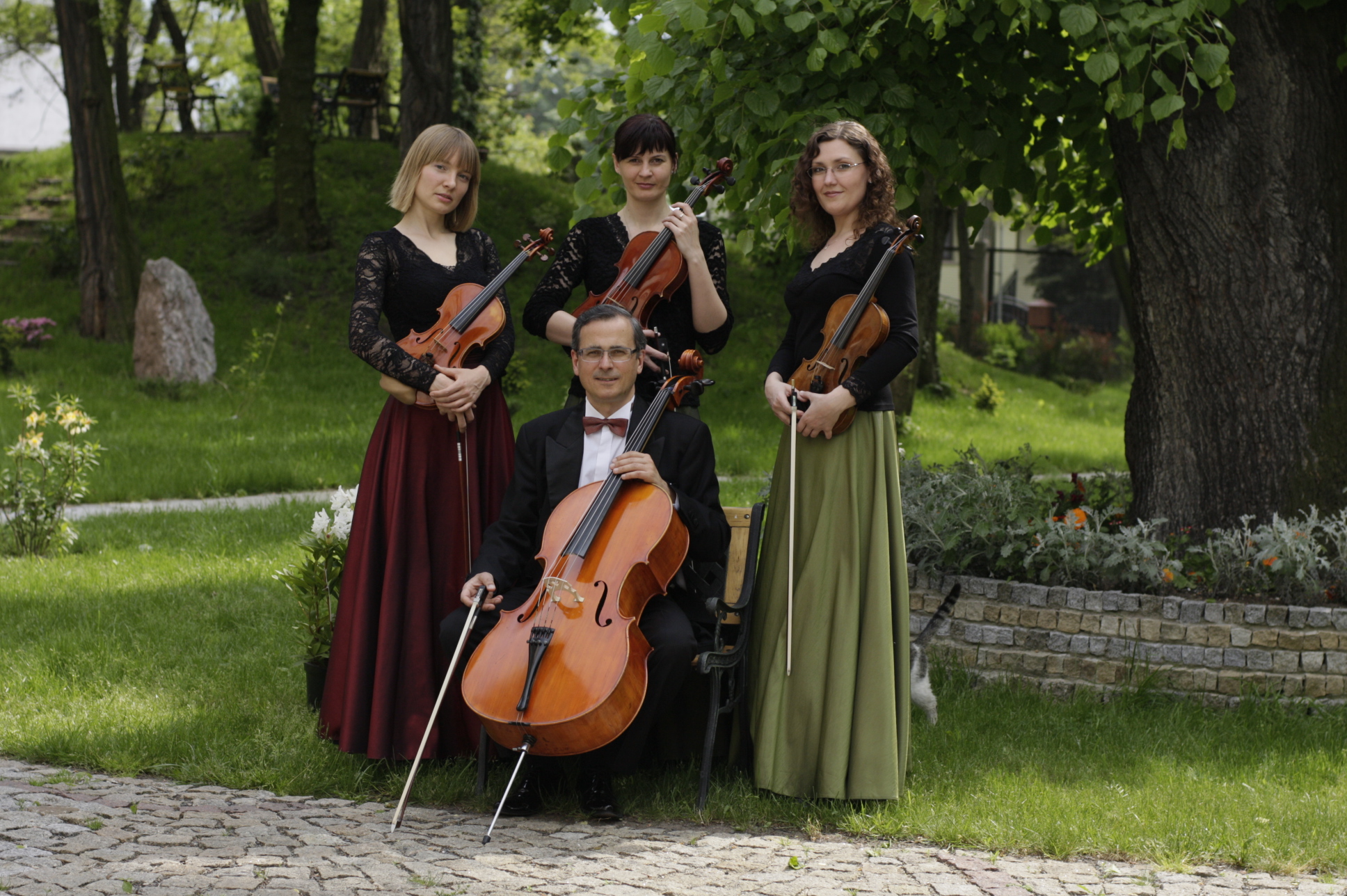“… a dazzling violinist..” in the words of Herman Trotter (High Fidelity Magazine)
Master Class, Minturno, Italy 14-18 July 2009 – registration up to 15 May2009
Veronica Schreiber Kadlubkiewicz graduated with highest honors of the Warsaw Academy of Music in Poland and continued her studies in the USA with Henryk Szeryng, Roman Totenberg and Paul Zukofsky. Finalist of the Alberto Curci Competition in Naples, Italy, she received a special award from the Rockefeller Competition for Excellence in American Music in Washington D.C. Ms. Kadlubkiewicz has appeared as soloist with orchestras in the USA, Poland, Italy and Spain. She has also frequently performed at such festivals as Marlboro Music, Bach Aria Festival, Monadnock Music, Estatedi Radicondoli, Musica Electronica Nova and Warsaw Autumn Festival. An avid performer of solo violin recitals sought out for her interpretations of contemporary music, each year she premieres new compositions written for her. She was a participant in the Sommerkurs fur Neue Musik in Darmstadt and a member of Creative Associates in Buffalo, NY.
Formerly concertmaster of the Polish Chamber Orchestra, Orquesta Filarmónica de Gran Canaria and the New Hampshire Symphony, Veronica Kadlubkiewicz has also played with the Orpheus Chamber Orchestra, the Boston Symphony Orchestra, and the New England Camerata. She taught violin and chamber music at the University of Massachusetts in Amherst, Smith College and Amherst College.
Ms. Kadlubkiewicz now resides in Paris, France where she has appeared at Salle Cortot; Ecole Normale Supérieure, rue d’Ulm; St. Julien le Pauvre; and Eglise de Trinité among others. Last season she performed in Italy, the USA, Poland, France and premiered compositions by Francois Nicolas, Salvatore Macchia and Beatriz Ferreyra, all written for her. The season 08/09 will see her giving many “all Bach” presentations of his solo violin works, the Concerto by Philip Glass as well as piano-violin recitals.
Ms. Kadlubkiewicz has recorded for Gasparo and CRI labels, Polish Radio, and WDR in Germany.
Kategoria: Weronika Kadłubkiewicz | Komentarze wył. »
Concert pianist, professor of piano, juror of piano competitions. Throughout her life music has been the central focus and inspiration. Conveying its inherent contents and emotions she considers her life mission fulfilled by performing and teaching. Maria Szraiber is also interested in various questions concerning both the composer’s work and its interpretation potential in the field of the piano literature as well as in the history of piano playing. She also devotes some of her time to the matters of the teaching process organization at the different levels of music education.
Born in Silesia Maria Szraiber there began the piano education leading her to the graduation from the Music Academy in Katowice.
Her teachers were: Wanda Chmielowska, heir of the famous piano school of T. Leschetizky and Bolesław Woytowicz, heir of the pure F. Chopin tradition, through Karol Mikuli, F. Chopin’s pupil. Maria Szraiber’s piano studies were completed at the famed P. Tchaykowsky Conservatory in Moscow where she worked under the guidance of Tatiana Nikolajeva and Rudolf Kerer, both well known representatives of the Russian school of piano playing.
Maria Szraiber has performed in concert halls throughout Poland and most of Europe, as well as in the United States, China, Japan, South Korea and Australia.
She has made many recordings. Playing the wide repertoire she is particularly associated with the music of Chopin and Debussy as well as with many works from the rich Polish piano literature. Some of her concerts have been enriched by her own comments.
Maria Szraiber often gives concerts in the places connected with Fryderyk Chopin, like Żelazowa Wola, the place of his birth, under the composer’s monument in the Łazienki Park in Warsaw and others.
In addition to performing Maria Szraiber loves to teach. She is a full professor at the Fryderyk Chopin University of Music in Warsaw where she was also elected dean of the Department of Piano, Harpsichord and Organ and was as well head of the Piano Chair.
For many years Maria Szraiber has been conducting master classes and giving lectures in Poland and abroad. She has sat on the jury of a number of piano competitions. In line with her interest in the history of piano playing she has been presenting a series of concert-lectures and reminiscences entitled “Nestors of Polish Piano Pianistics”. As a result of the series a two volume publication appeared under the same title including biographies and reminiscences devoted to Zbigniew Drzewiecki, Jerzy Lefeld, Aleksander Michałowski, Stanisław Szpinalski, Józef Śmidowicz, Margerita Trombini-Kazuro, Józef Turczyński, Maria Wiłkomirska and Jerzy Żurawlew. The book, published also in English, is accompanied by CDs with the recordings of the presented pianists.
Maria Szraiber’s interest in teaching led her to prepare a large monograph On Educating the Artist-Performer at the College Level of Piano Studies (AMFC, Research Bulletin no. 44, Warsaw, 1999).
Studying and interpreting the literature for the piano as well as artistic activities of great composers are sources of inspiration for her writings and lectures. Here are a few examples:
- The Waltz. The Road to Artistic Stylisation in the Work of F. Chopin – an article contributed to “Fuga” (2001 no. 4),
- C. Debussy – composer of piano music and pianist (Gdańsk Music Academy, Research Bulletin “Piano Music”, Gdańsk 2004);
- Polish Piano Playing Tradition. The Leschetizky heritage in the rich history of Polish XXth century pianistics and piano pedagogy (Universität für Musik und darstellende Kunst, Wien 2006);
- T.Leschetizky – great teacher of pianists (Gdańsk Music Academy, Research Bulletin “Piano Music”, Gdańsk 2007);
- lectures and comprehensive talks accompanying specially profiled concerts, e.g.:
- o F. Chopin’s waltzes – The peak achievement of artistic stylisation of dance;
- o Polish pianists of international renown at the turn of the XXth century;
- o Polish piano music in the Chopin circle (1999);
- o Edward Grieg – composer, pianist, conductor (1997);
- o Grażyna Bacewicz – the universal musician.
Maria Szraiber has always been deeply concerned about the organization of music education at all levels. During her long term as dean she launched various initiatives in the search for the optimal syllabus for music universities. She also serves as an expert advisor for the Ministry of National Education.
Kategoria: Maria Szraiber | Komentarze wył. »
“Of all my students, Magda plays in the most beautiful way…” – that is how Tadeusz Wroński, a longtime professor of the Academy of Music in Warsaw, one of the greatest and most versatile of Polish teachers of the art of violin playing, used to say about Magdalena Rezler-Niesiołowska. The artist proved that opinion was justified by winning a number of such reputable international violin competitions as Queen Elisabeth of Belgium in Brussels, Jacque Thibaud in Paris or Karl Flesch in London. She also won medals at the Biennale in Bordeaux and, together with her string quartet, in Budapest.
Born in Bydgoszcz, in a known family of musicians, she graduated from the Academy with honors, being a student of Professor Wroński and of closely cooperating with him Stanisław Kawalla. As a soloist, she takes part in symphony and chamber concerts and performs recitals in almost all European countries, but also in the USA, Mongolia and South Korea. Her performance was often recorded for the radio and television in Poland, Czechoslovakia, East Germany, West Germany, Belgium and France. Her repertoire includes over 30 concertos with orchestra and 20 recitals. She was a concertmistress of the “National Philharmonic Chamber Musicians” orchestra of Karol Teutsch, performing many solo concertos with it; currently she also takes part in chamber concertos in Germany and Switzerland, cooperating with excellent instrumentalists, such as “Freiburger Barock Solisten.”
Magdalena Rezler-Niesiołowska, following the steps of her professors, is an excellent educator – for many years she led a violin class in her home Warsaw university, and since 1991 she has been a professor in the renown Hochschule für Musik in Freiburg (Germany). Her graduates are members of symphony orchestras in Berlin, Frankfurt, Stuttgart, Bremen, Hamburg, Detmold, Freiburg, Warsaw, Budapest, Zurich, Istanbul, Seoul, Tokyo and of the International Mahler Orchestra. She conducts master courses in Germany, Poland, South Korea, Japan, Austria and the USA. She is a jury member of violin competitions in Poland and abroad.
Her latest CD “Con bravura e sentimento” with Polish virtuoso music for solo violin, recorded with her husband, a well known conductor Maciej Niesiołowski, gained wide attention and admiration. Wanda Wiłkomirska wrote about it in the letter to performers: “…congratulations both for the idea and for performance….Magda’s performance is unusually delightful…You play Wieniawski Polonaise better than all the candidates for the Wieniawski Competition put together…Scherzo-Tarantella sounds perfect, but to be effective it must be played with such rhythmic precision and such fantastic accompaniment as you do…”
For the last few years (2005-2007) Magdalena Rezler-Niesiołowska has performed mainly in Germany – a lot of recitals of diverse scope, such as a solo recital (with sonatas of Bach, Bartók, Bacewiczówna, Ysaÿe and Meyer), all Beethoven’s sonatas, recitals of Polish music and other. Moreover, together with recognized artists, she took part in many concerts of chamber music with orchestras in Poland, Switzerland and Germany. Recently, with “Capella Bydgostiensis,” she performed Mozart concertos in Germany. With the National Polish Radio Symphony Orchestra in Katowice, she played a violin concerto of Krzysztof Meyer and with Juliusz Berger – concerto for violin and violoncello of the same composer.
Kategoria: Magdalena Rezler-Niesiołowska | Komentarze wył. »
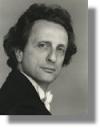 Andrea Passigli studied in Italy and in the United States. He graduated cum laude from the Conservatory L. Cherubini in Florence under the guidance of Maria Tipo and participated in the Marlboro Music Festival at the invitation of Rudolf Serkin, whose teaching had a fundamental role in his musical development, which is mainly directed towards Viennese classicism. Important points of reference in his education where also his meetings since childhood with Pablo Casals, Nikita Magaloff.. Mr. Passigli, who has constant interest for chamber music and Lied, has performed in recitals and concertos in Italy, U.S.A, Austria, England, Holland, Russia, Rumania, Yugoslavia, Hungary and Poland. He has recorded an album of 2CD with music for piano solo by Schubert, edited by fonè, a CD dedicated to Lieder on texts by Heine with the baritone Leonardo Wolovsky, and one on French impressionism with flutist Alexander Duisberg edited by Ema Records. He is Professor of Piano at the Conservatory G. Frescobaldi in Ferrara.
Andrea Passigli studied in Italy and in the United States. He graduated cum laude from the Conservatory L. Cherubini in Florence under the guidance of Maria Tipo and participated in the Marlboro Music Festival at the invitation of Rudolf Serkin, whose teaching had a fundamental role in his musical development, which is mainly directed towards Viennese classicism. Important points of reference in his education where also his meetings since childhood with Pablo Casals, Nikita Magaloff.. Mr. Passigli, who has constant interest for chamber music and Lied, has performed in recitals and concertos in Italy, U.S.A, Austria, England, Holland, Russia, Rumania, Yugoslavia, Hungary and Poland. He has recorded an album of 2CD with music for piano solo by Schubert, edited by fonè, a CD dedicated to Lieder on texts by Heine with the baritone Leonardo Wolovsky, and one on French impressionism with flutist Alexander Duisberg edited by Ema Records. He is Professor of Piano at the Conservatory G. Frescobaldi in Ferrara.
Kategoria: Andrea Passigli | Komentarze wył. »
Pianista Andrea Passigli studiował we Włoszech i USA. Ukonczyl z najwyzszym odznaczeniem Konserwatorium L. Cherubini we Florencji w klasie Marii Tipo. Na zaproszenie Rudolfa Serkina uczestniczył w Marlboro Music Festival. Rudolf Serkin miał duży wpływ na muzyczny rozwój artysty i jego szczegolne zainteresowanie wiedeńskim klasycyzmem. Silny wpływ na osobowość artysty mieli również Pablo Casals i Nikita Magaloff, z którymi spotykał się od dzieciństwa. Andrea Passigli jest solistą, kameralistą i posiada glebka znajomosc repertuaru Lieder. Grał recitale i koncerty we Włoszech, USA, Austrii, Angli, Holandii, Rosji, Rumunii, Jugosławii, na Węgrzech i w Polsce. Nagrał podwójny album z muzyką na fortepian solo Schuberta wydany przez “foné” oraz CD “Ema Records” z flecistą Alexandrem Duisbergiem, poświęcony francuskiemu impresjonizmowi, jak również CD z barytonem Leonardo Wolovsky z Lieder do tekstow Heinego. Andrea Passigli jest profesorem fortepianu w Konserwatorium G. Frescobaldi w Ferrarze we Włoszech.
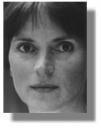 Skrzypaczka Weronika Kadłubkiewicz jest absolwentką Wyższej Szkoły Muzycznej w Warszawie w klasie Krzysztofa Jakowicza. Kontynuowała studia z Henrykiem Szeryngiem i Romanem Totenbergiem w USA. Solistka wielu orkiestr w Polsce, USA i Europie, koncertmistrz New Hampshire Symphony, Orchesta Filarmonica de Gran Canaria i Polskiej Orkiestry Kameralnej. Grała również z Boston Symphony i Orpheus Chamber Orchestra. Dwukrotnie uczestniczyła w Sommerkurse w Darmstadt, a na zaproszenie Lejarena Hillera była rezydentką Creative Associates w Buffalo NY. Występowała na scenach w Polsce, Hiszpanii, Włoszech, Szwecji, Francji, Niemczech, Szwajcarii, Kanadzie i USA. Utalentowana wykonawczyni skrzypcowej muzyki współczesnej ma na swoim koncie prawykonania utworów, z których wiele zostało napisanych specjalnie dla niej. Weronika Kadłubkiewicz brała udział w festiwalach: Warszwska Jesień, Marlboro Music Festival, Bach Aria, Monadnock Music i inne. Prowadziła klasę skrzypiec i muzyki kameralnej w Amherst College, University of Massachusetts i w Smith College. Nagrała płyty dla firm Gasparo i CRI. Po dwudziestu latach pobytu w Stanach Zjednoczonych przeniosła się do Paryża.
Skrzypaczka Weronika Kadłubkiewicz jest absolwentką Wyższej Szkoły Muzycznej w Warszawie w klasie Krzysztofa Jakowicza. Kontynuowała studia z Henrykiem Szeryngiem i Romanem Totenbergiem w USA. Solistka wielu orkiestr w Polsce, USA i Europie, koncertmistrz New Hampshire Symphony, Orchesta Filarmonica de Gran Canaria i Polskiej Orkiestry Kameralnej. Grała również z Boston Symphony i Orpheus Chamber Orchestra. Dwukrotnie uczestniczyła w Sommerkurse w Darmstadt, a na zaproszenie Lejarena Hillera była rezydentką Creative Associates w Buffalo NY. Występowała na scenach w Polsce, Hiszpanii, Włoszech, Szwecji, Francji, Niemczech, Szwajcarii, Kanadzie i USA. Utalentowana wykonawczyni skrzypcowej muzyki współczesnej ma na swoim koncie prawykonania utworów, z których wiele zostało napisanych specjalnie dla niej. Weronika Kadłubkiewicz brała udział w festiwalach: Warszwska Jesień, Marlboro Music Festival, Bach Aria, Monadnock Music i inne. Prowadziła klasę skrzypiec i muzyki kameralnej w Amherst College, University of Massachusetts i w Smith College. Nagrała płyty dla firm Gasparo i CRI. Po dwudziestu latach pobytu w Stanach Zjednoczonych przeniosła się do Paryża.
Kategoria: A.Passigli & V.Kadlubkiewicz | Komentarze wył. »
 They’ve met in 2006 in Paris…a place between Poland and Argentina…She – Polish, born to a musical Silesian family, plays classical and contemporary music all over the worldHe – born in Argentina, the cradle of tango, to a family where everybody plays tango on different instruments…
They’ve met in 2006 in Paris…a place between Poland and Argentina…She – Polish, born to a musical Silesian family, plays classical and contemporary music all over the worldHe – born in Argentina, the cradle of tango, to a family where everybody plays tango on different instruments…
They’ve met in tango…
Duo Cordato is inviting you to a tango, an emotional journey via laughter and fascination, flirt and jealousy, passion, sensuality and love. Manuel Romero said: “Tango is not only a dance. Tango is a kind of lifestyle, state of mind and philosophy. Tango was born from the very deep inside of a human soul and therefore its language is understood by every human being.”
Tango was born in the street. Today it is being played in grand concert halls and danced everywhere.
Tango is a ballroom dance originating from Buenos Aires in Argentina and Montevideo in Uruguay. Habanera and flamenco, the Spanish traditions transplanted to South America, mixed with “candombe”, the dance of African slaves performed and sang at street parades, are at its roots. The word “cum-tan-go” is being repeated in the refrain and this is where “tango” comes from. With a time “candombe” was transformed into “milonga”.
Astor Piazzola (1921-1992) was a musical genius for whom the national dance became a raw material on the basis of which he has invented a completely new music genre. He raised the status of tango from town music to classical music. Piazzola was a great visionary composer, recognised internationally. Unfortunately, he had to fight with the lack of understanding in his own country.
Kacper Podrygajło has written: “In Piazzola’s music the Bach tradition clashes with dances originating from Buenos Aires brothels…In the Baroque tradition everything was mixed up and nobody paid attention to possible misalliance. Gigue (old French ham) was worshiped and by means of this act became an integral part of the Baroque mass. Da chiesa sonata rarely occurred alone. Suite was composed of a cycle of dancing pieces which usually differed from their original versions. We find the same in Piazzola’s music. He writes tango in such a stylized manner that each piece of music differs from each other and, at the same time, they are identical with what they do not represent. However, it does not mean that they are written in a way Bach would have written them if he had lived to our days.”
Duo Cordato with Veronica Kadlubkiewicz violin and Sebastian Cordato guitar and voice perform music of Astor Piazzola’s as well as their own improvisations on dancing music from Argentina.
Kategoria: Duo Cordato | Komentarze wył. »
 They seem to have been cast in the same mould, very much like two beans in a sackful of coffee. It should be added – an exceptionally strong and aromatic coffee. Quite simply – “Doppio Espresso”.
They seem to have been cast in the same mould, very much like two beans in a sackful of coffee. It should be added – an exceptionally strong and aromatic coffee. Quite simply – “Doppio Espresso”.
They heard someone ordering a ‘doppio espresso’ in a bar and fell under the spell of the drink’s strength.
The fact that this is what they decided to call their duo tells us much about the kind of impact they want to make on listeners. Surely, their performances are not luke-warm.Interestingly enough, they became friends long before the duo saw the light of day. They were in secondary school at the time. They first met at the Piano Festival in Nałęczów and the masterclasses given there by Micha³’s father, the prominent pianist Marek Drewnowski.Daniel attended at that time the Secondary Music School in Krosno, studying in the piano class of Dorota Skibicka. He subsequently studied with Marek Drewnowski. Before he became his student, he once moved his future professor to tears with his playing of Chopin’s music. These were tears of emotion, to which the professor himself admitted. Daniel was already then a very sensitive and reflective man. He read a lot. He made much effort to strike a balance between emotion and intellect in his playing.Michał, for his part, drove to tears another outstanding pianist, Naum Shtarkman, to whom he presented his interpretation of Scarlatti’s Sonata in F minor in the same venue the previous year. Michał had always wanted to play an ambitious repertoire (Liszt, Rachmaninov) and he could listen passionately to his beloved Vladimir Horovitz, from whom he derived his musical inspiration.Studying together, Daniel and Michał continued to be close friends, even though the nature of their profession would rather provoke stiff competition between them. During their studies at the Conservatoire de Musique in Geneva (where they both went after graduating from the Music Academy in Łódź), they decided to set up a duo. They made their debut in the prestigious Victoria Hall in Geneva, with a programme including works by Leonard Bernstein and Astor Piazzolla. Right now, with Michał back in Łódź and Daniel in Krosno, their duo continues to perform and record. This debut CD is a discovery of the New World, for themselves and for music lovers. In Europe, the music of both Americas, and of South America in particular, is something new and somewhat exotic. These days it is simply fashionable, with almost all people easily recognizing the tune of Astor Piazzolla’s Libertango or the themes of Bernstein’s West Side Story. In addition to these two great masters, the CD contains miniatures by Piazolla’s artistic followers, Pablo Ziegler and José Bragato, as well as Brazilian Dance by the Canadian composer Roger Matton. This last piece is a like a symbolic blend of the CD’s two parts – the music of North and South America. It should be hoped that the great passion and commitment of the duo “Doppio Espresso” will help all listeners gain better insights into this music and fall in love with it.
Ewa Cisowska
Michał Drewnowski was born in Warsaw in 1977. He started learning to play the piano in Italy, when he was 8, under the supervision of his father, an excellent pianist Marek Drewnowski. After his return to Poland at the age of 14, he continued his musical education, at Karol Szymanowski Secondary Music School in Warsaw in the class of professor Bronisława Kawalla and Professor Ewa Pobłocka. In 2001 he graduated with honours from Bacewicz Music Academy in Łódź, where he studied under the guidance of his father, professor Marek Drewnowski. He also developed his skills in Genf Conservatory of Music with such distinguished teachers as Dominique Merlet and Pascal Devoyon; there he also obtained a diploma with distinction. He took part in many master courses given by such eminent pianists as Nauma Shtarkmann, Miłosz Magin, Fou T’song, Rudolf Kehrer and Eugen Indjic.
He is a prize-winer in the following competitions: Special Prize at the 1st Aleksander Tansman International Festival and Competition of Musical Personalities in Łódź (1996), First Prize at 13th Grażyna Bacewicz All-Polish Chamber Music Competition in Łódź (1998), at 32th Polish Piano Festival in Słupsk (1998), Second Prize at M.Masin International Piano Festival in Sangemini (Italy, 2000), Second Prize at Piano Competition A.GI.MUS in Rome (2005).
Michał Drewnowski gives concerts, both as a soloist and a chamber musician, in Poland, Italy, France, Switzerland, Luxembourg, Belgium, England, Austria, Czech Republic and Germany. He has performed with many renowned orchestras in Poland and abroad with leading conductors such as Piotr Wijatkowski, Janusz Powolny, Tadeusz Kozłowski, Vladimir Kiradjev and Stanislav Oushev. He participated in many prestigious festivals, such as Passage in Warsaw, Salon of Arts in Sofia, Festival Musicale di Norcia (Italy), Varna Summer Festival (Bulgaria), Cracow Spring Music Festival, Warsaw Music Encounter, Chopin Geneve Festival, Keminklavier in Kemi (Finland).
He also gave concerts in: Concerti Gianicolo in Rome, Steinway Kammersal in Kopenhaga, Kunstmuseum in Silkeborg (Denmark), Sala Bulgaria in Sofia, Wigmore Hall in London. In the period of 2000-2001 he participated as a pianist and also an actor at Teatr Nowy in Warsaw in a play of Adam Hanuszkiewicz “Chopin, his life, his love, his music”. He perfomed the main character – Frederic Chopin.
Michał Drewnowski is a cofounder of Voland Quartet, with which he gave concerts in many countries of Europe. They also made recordings for GEGA NEW company where they play the music of B.Bartok, A.Aroutunian, A.ben Shabetai, J.Bauer, G.Arnaoudov, H.Yotzov for two pianos and percussion. He is also a cofounder of piano duet Doppio Espresso, that specialises in music of American and Latinoamerican composeres, such as L.Bernstein, A.Piazzolla, P.Ziegler, and J.Bragato.
Daniel Eibin graduated from the Music Academy in Łódź, where he studied with Marek Drewnowski (a diploma with distinction), and the Conservatoire de Musique in Geneva, with Elizabeth Athanassova. His honours include First Prizes at the International Chamber Music Competition in Łódź (2001), the Chopin International Piano Competition in Antonin (1996) and the National Competition of Chamber Ensembles in Wrocław (1994). He is also a prizewinner of the Józef Hofmann and Ignacy Jan Paderewski Competition in Nałęczów (1997). He gave several concerts during the “Festival du Printemps – Sacre de la Musique” in France (1997). He held grants from the Minister of Culture (1996, 2001) and the Fondation Norbert Schenkel in Geneva (2004).
He perfected his skills attending masterclasses given by Janusz Olejniczak, Lee Kum Sing, Ivana Klansky, Alfonso Montecino and Eugene Indjic. He has made recordings for Polish Radio and Polish Television.
He is a co-founder of the piano duo “Doppio Espresso” which performs modern classical music. He developed a fine career, with regular performances in Poland and many European countries, both in recitals and in chamber ensembles performing music of various periods. In 2002 he began a teaching career. [/english]
Kategoria: Doppio Espresso | Komentarze wył. »
The Stone group was formed in 2003. Its members are Michał Wróblewski, playing the violin, and Adam Wróblewski, playing the cello. The Stone is an aviant-garde group, whose compositions are based on trance music, and that it why the goal of the concerts is to create a suggestive trance similar to ritual music from various cultures (elements of Oriental music, psychedelic rock and free jazz). Trying to define their work, the group uses the term electrosonoromedium (musicians are the medium of the new electro-acoustic sound). A concert is divided into thematically interrelated sets, improvised based on the prepared form. In 2005, in Leipzig, a premiere of the spectacle “Mom, let me dance Mahler” by the “Cinema” Theater, with music of the group, took place.
Michał Wróblewski is a graduate of the Academy of Music in Wrocław, Prof. Marek Pijarowski’s conductor’s class. He started his musical education at the age of 7 in the State Music School of the 1st grade in Wrocław, learning to play the violin. He earned his Professional Instrumentalist Diploma specializing in violin playing, studying under the supervision of an excellent violinist Prof. Michał Grabarczyk in Poznań. He cultivated his skills by attending international violin competitions with such masters as, among others, Prof. R. Totenberg (USA), R. Szreder (The Netherlands), K. Węgrzyn (Germany) and a conducting course under the guidance of Maestro Kurt Masur. As participant of modern music courses, he learned from Prof. S. Esztenyi and Prof. H. Fiore. Michał Wróblewski has been involved in chamber music for many years (winner of chamber music competitions). Being a member of the groups “Wróblewski – Trio,” “Musica Poetica Nova,” he took part in many festivals (among others “Wratislavia Cantans,” “Where the Fountains Play”) and his performance was often recorded for the needs of the radio, television, and movie industry. He conducted music workshops with theatrical groups from Poland and Germany (including graduates of Kolleg für dramatische Kunst in Bremen). His debut as a conductor took place in March 2004, in “Oratorium Marianum” Hall of the University of Wrocław, during the “Classic Premiere” festival. Wróblewski’s repertoire includes works of each kind of music, from classical to rock music.
Adam Wróblewski is a student of the Academy of Music in Poznań in Eugeniusz Zboralski’s cello class. He started his musical education at the age of 7, learning in music schools in Wrocław and Poznań. He cultivated his artistic skills by attending international cello courses, perfecting performance with such masters as, among others, Prof. R. Jabłoński (Spain), Prof. K. Michalik, Prof. S. Firlej and by attending modern music courses conducted by Prof. B. Schaeffer and Prof. S. Esztenyi. A winner of chamber music competitions, he has been involved in this music for many years. As a member of the groups “Wróblewski – Trio,” “Musica Poetica Nova,” he took part in many festivals (among others “Wratislavia Cantans,” “Where the Fountains Play”) and his performance was often recorded for the needs of the radio, television, movie industry and theater. From 2001 to 2003 he cooperated with the Sachsen-Anhalt Youth Symphony Orchestra. In 2002 Wróblewski took part in the Visegrád Youth Philharmonic tour through Poland, Hungary, the Czech Republic, and Slovakia.
Kategoria: The Stone | Komentarze wył. »
Jerzy Maciejewski began to study piano at the age of five and continued very extensive music education until he became a student at The Fryderyk Chopin Warsaw Academy of Music. He received master’s degree in piano as a student of Maria Wilkomirska. Jerzy Maciejewski is currently the Professor at The Warsaw Academy of Music in Warsaw and Visiting Professor Kaemyung – Chopin Academy in Daegu (South Korea). Every year he is being invited to give workshops and seminars at the Master’s Training Programs in Poland and abroad, for instance at The Wiener Musik Seminars in Vienna, Austria. He is also participating in a special music events for children and young audience organized by National Philharmonics in Poland.
His artistic career was launched when he was still a student at The Academy of Music. Being a member of The Fryderyk Chopin’s Society in Poland, he gave a number of piano concerts. As a talented pianist he was granted multiple scholarships from The Fryderyk Chopin’s Society.
During his artistic career Jerzy Maciejewski cooperated very closely with The Fryderyk Chopin’s Society of Warsaw. During that time he gave a number of recitals in places where Fryderyk Chopin was born and lived. The examples of concerts in such places are: Chopin Family’s house in Żelazowa Wola where Chopin was born, and concerts at the Chopin’s Monument at Łazienki Park in Warsaw. The pianist participated in many prestigious piano festivals, e.g. in Duszniki and Słupsk, Poland. He was invited to participate in philharmonic performances in Poland and most of the European countries as well as in South Korea and Mexico. During the last few years he performed a wide variety of classical and contemporary music; for example music by George Crumb and Stanisław Moryto.
Jerzy Maciejewski performed many of original works of contemporary composers as solo concerts as well as with chamber, and philharmonic orchestras.
Within the several years, an artist was particularly interested in working with chamber groups, and outstanding polish musicians. Together they gave many chamber performances in Poland and abroad. Jerzy Maciejewski is the creator of The Ignacy Jan Paderewski’s Piano Trio Group and co-creator of The Camerata Vistula Chamber Music Group in Poland.
An artist recorded complete works of Karol Szymanowski for violin and piano together with violinist Magdalena Rezler, as well as songs of Fr. Chopin and I. J. Paderewski sung by Ewa Izykowska.
He is also known as an interpreter of music for two pianos and drums by Bela Bartok and George Crumb in cooperation with Stanisław Skoczynski.
On average he performs about 60 concerts per year, solo or with other artists and/or orchestras.
Kategoria: Jerzy Maciejewski | Komentarze wył. »
The Opole String Quartet Quodlibet was formed by graduates of the Academies of Music in Wroclaw and Katowice, musicians from the Józef Elsner State Philharmonic Orchestra in Opole.
Members of the quartet:
Jacek Adamaszek – violin,
Barbara Zwolińska-Kobiela – violin,
Łucja Butor – cello,
Dariusz Stark – viola.
The group has a very wide and varied repertoire. It plays great compositions of classical and light music, including very popular pieces. Since its beginning, it has successfully contributed to many significant and important events for Opole city and the whole Opole region.
Ms. Dorota Simonides, Senator of the Republic of Poland, Prof., PhD, expressed her appreciation: “Whenever I listen to you, each time I enter the magic world of music. It is not only the occasion to calm myself down and a means of escape from hurry-scurries, but it allows me to transfer to a dimension of harmony and beauty, where I restore my strength and revive my spirit for further action. Except my gratitude and wishes of further successes.”
Kategoria: Quodlibet | Komentarze wył. »
Class Jam-Quartet merges the beauty of classical music with jazz. Its goal from its conception was to combine everlasting achievements of the past with modern times. Chopin once said: “Bach resembles an astronomer to me – some people seem to notice nothing more but complex algorithms in him, but others, who can feel and understand him, are led by Bach to his huge telescope through which he allows them to admire the stars of his masterpieces. If any generation turns it back on Bach, it will give a sad witness of its shallowness, foolishness and bad taste.”
They start each concert with Bach. Jazz adaptations of classical works are written for the group by Michał Wróblewski.
Members of the quartet:
Weronika Kadłubkiewicz – violin,
Michał Wróblewski – violin,
Adam Wróblewski – cello,
Juliette Ciesla – piano.
Their first concert was in May 2008, in Paris, and it received an enthusiastic reception.
Juliette Ciesla A French pianist, Juliette Ciesla, born in 1971 graduated from Conservatoire National de Region de Lyon in 1990 with a gold medal. In that same year she was accepted at Conservatoire Superieur de Musique (CNSM) in Paris, to the Dominique Merlet’s class. She is a CNSM prize winner in piano (Georges Pludermacher’s class), chamber music (Christian Ivaldi’s and Alain Planes’ class), as well as in accompanying the singing, which she later perfected under such Lieder masters as Hartmut Holl, Mitsuko Shirai, Gerard Souzay, and Kurt Moll. She worked on the piano repertoire in Clive Britton’s class, a former student of Claudio Arrau and continues her education under the supervision of Marie-Francoise Bucquet and Jorge Chamine in Paris and in Italy. As a soloist, Juliette Ciesla regularly gives concerts in Paris (“les journees du Vaisseau Fantome,” Sala Cortot, Saint Merry Church, Cercle Bernard Lazard) and throughout France. In 2001 she had a tour in France for Yamaha pianos. In 2003, during the International Miłosz Magin Competition, she received a reward for the best performance of Frédéric Chopin’s Mazurka op. posthume. In 2005, supported by Paris association “Jeunes Talents” and France Musique radio, she was invited to de Gaelle Le Gallic “Dans la Cour des Grands” program.Apart from France, Juliette Ciesla gave concerts as a soloist in the 2nd Frédéric Chopin Piano Concert in Italy and Germany, and in recital programs. With her brother Alexis Ciesla (clarinet, CNSM First Prize in Geneva) she performs duet “Paris-Varsovie,” promoting Polish and French music (their father is a Pole, and mother a Frenchwoman). Currently Juliette Ciesla divides her time between Paris and Annecy, where she teaches at the CRR Conservatory.
Veronica Kadlubkiewicz graduated with highest honors of the Warsaw Academy of Music in Poland and continued her studies in the USA with Henryk Szeryng, Roman Totenberg and Paul Zukofsky. Finalist of the Alberto Curci Competition in Naples, Italy, she received a special award from the Rockefeller Competition for Excellence in American Music in Washington D.C. Ms. Kadlubkiewicz has appeared as soloist with orchestras in the USA, Poland, Italy and Spain. She has also frequently performed at such festivals as Marlboro Music, Bach Aria Festival, Monadnock Music, Estatedi Radicondoli, Musica Electronica Nova and Warsaw Autumn Festival. An avid performer of solo violin recitals sought out for her interpretations of contemporary music, each year she premieres new compositions written for her. She was a participant in the Sommerkurs fur Neue Musik in Darmstadt and a member of Creative Associates in Buffalo, NY.Formerly concertmaster of the Polish Chamber Orchestra, Orquesta Filarmónica de Gran Canaria and the New Hampshire Symphony, Veronica Kadlubkiewicz has also played with the Orpheus Chamber Orchestra, the Boston Symphony Orchestra, and the New England Camerata. She taught violin and chamber music at the University of Massachusetts in Amherst, Smith College and Amherst College.Ms. Kadlubkiewicz now resides in Paris, France where she has appeared at Salle Cortot; Ecole Normale Supérieure, rue d’Ulm; St. Julien le Pauvre; and Eglise de Trinité among others. Last season she performed in Italy, the USA, Poland, France and premiered compositions by Francois Nicolas, Salvatore Macchia and Beatriz Ferreyra, all written for her. The season 08/09 will see her giving many “all Bach” presentations of his solo violin works, the Concerto by Philip Glass as well as piano-violin recitals.Ms. Kadlubkiewicz has recorded for Gasparo and CRI labels, Polish Radio, and WDR in Germany.
Adam Wróblewski is a student of the Academy of Music in Poznań in Eugeniusz Zboralski’s cello class. He started his musical education at the age of 7, learning in music schools in Wrocław and Poznań. He cultivated his artistic skills by attending international cello courses, perfecting performance with such masters as, among others, Prof. R. Jabłoński (Spain), Prof. K. Michalik, Prof. S. Firlej and by attending modern music courses conducted by Prof. B. Schaeffer and Prof. S. Esztenyi. A winner of chamber music competitions, he has been involved in this music for many years. As a member of the groups “Wróblewski – Trio,” “Musica Poetica Nova,” he took part in many festivals (among others “Wratislavia Cantans,” “Where the Fountains Play”) and his performance was often recorded for the needs of the radio, television, movie industry and theater. From 2001 to 2003 he cooperated with the Sachsen-Anhalt Youth Symphony Orchestra. In 2002 Wróblewski took part in the Visegrád Youth Philharmonic tour through Poland, Hungary, the Czech Republic, and Slovakia.
Michał Wróblewski is a graduate of the Academy of Music in Wrocław, Prof. Marek Pijarowski’s conductor’s class. He started his musical education at the age of 7 in the State Music School of the 1st grade in Wrocław, learning to play the violin. He earned his Professional Instrumentalist Diploma specializing in violin playing, studying under the supervision of an excellent violinist Prof. Michał Grabarczyk in Poznań. He cultivated his skills by attending international violin competitions with such masters as, among others, Prof. R. Totenberg (USA), R. Szreder (The Netherlands), K. Węgrzyn (Germany) and a conducting course under the guidance of Maestro Kurt Masur. As participant of modern music courses, he learned from Prof. S. Esztenyi and Prof. H. Fiore. Michał Wróblewski has been involved in chamber music for many years (winner of chamber music competitions). Being a member of the groups “Wróblewski – Trio,” “Musica Poetica Nova,” he took part in many festivals (among others “Wratislavia Cantans,” “Where the Fountains Play”) and his performance was often recorded for the needs of the radio, television, and movie industry. He conducted music workshops with theatrical groups from Poland and Germany (including graduates of Kolleg für dramatische Kunst in Bremen). His debut as a conductor took place in March 2004, in “Oratorium Marianum” Hall of the University of Wrocław, during the “Classic Premiere” festival. Wróblewski’s repertoire includes works of each kind of music, from classical to rock music.
Kategoria: Class Jam-Quartet | Komentarze wył. »
Michał Wróblewski, conductor, arranger and violinist is a musician with interesting personality. He is a graduate of the Academy of Music in Wrocław, Prof. Marek Pijarowski’s conductor’s class.He started his musical education at the age of 7 in the State Music School of the 1st grade in Wrocław, learning to play the violin. He earned his Professional Instrumentalist Diploma specializing in violin playing, studying under the supervision of an excellent violinist, Prof. Michał Grabarczyk in Poznań. He cultivated his skills by attending international violin competitions with such masters as, among others, Prof. R. Totenberg (USA), R. Szreder (The Netherlands), K. Węgrzyn (Germany) and by attending a conducting course under the guidance of Maestro Kurt Masur. As an attendant of modern music courses, he learned from Prof. S. Esztenyi and Prof. H. Fiore. As a winner of chamber music competitions, he has been involved in this music for many years. Being a member of the groups “Wróblewski – Trio,” “Musica Poetica Nova,” he took part in many festivals (among others “Wratislavia Cantans,” “Where the Fountains Play”) and his performance was often recorded for the needs of the radio, television, and movie industry. Michał Wróblewski conducted music workshops with theatrical groups from Poland and Germany (including graduates of Kolleg für dramatische Kunst in Bremen). His debut as a conductor took place in March 2004, in “Oratorium Marianum” Hall of the University of Wrocław, during the “Clasic Premiere” festival. Wróblewski’s repertoire includes works of each kind of music, from classical to rock music.
The review in AG in 2006 “Rock’n’Rollers in the Wild West” by Grzegorz Cholewa:
“All music projects which tried to smash rock with classical music, were always, as it were, total in their nature. “The Shadows of Wrocław” was no exception. On Sunday over sixty musicians stood on the floor of the hall of the Film Production Company: four-person rock group Nurt and symphonic Visegrád Youth Philharmonic Orchestra, formed by under-age students of music schools in Poland, Hungary, Slovakia and the Czech Republic.
A year ago, at the Visegrád Festival, young musicians handled successfully jazz-rock acrobatics of Voo Voo – now they had to face the rock classics. This time led by Michał Wróblewski, symphonists played with admirable discipline, vigor, and rock gusto, seasoning almost half-century-old hits with completely new emotions.Very original arrangements were astonishing. A large part of the credit goes to the conductor who had been preparing the orchestra for almost half a year for the Sunday concert. Michał Wróblewski’s contribution to independence of the arrangements is obvious – the group and orchestra matched perfectly and complemented each other. On the other hand – if their parts were listened to independently from each other, the effect would be equally interesting and complete.Overall, seventeen pieces were played, most from the repertoire of the legendary group The Shadows: “Atlantis,” “Wonderful Land,” “Guitar Tango,” “Apache,” “Kon Tiki,” and “Man of Mystery.” Moreover, there was a standard Duke Ellington’s “Caravan” and a beautiful version of the Beatles’ “Michelle.” As befitting for such oldish songs, everything was enshrouded in a beat music atmosphere. Although tuneful and catchy melodies notoriously got into almost cowboy style, the audience had no objections at all. Several hundred people, most of whom likely remember the times of The Shadows, went wild with enthusiasm, at the end refusing to let the musicians leave the stage!The Sunday concert “The Shadows of Wrocław” is a dream come true for Alek Mrożek, the guitarist from Wrocław, who had waited for it for years. The project proved to be a complete success but the valid question is: what’s next? A CD or DVD? A series of exclusive concerts? Such a trip into the old times of the world rock has a universal value.”
Kategoria: Michał Wróblewski | Komentarze wył. »
Adam Wróblewski jest studentem Akademii Muzycznej w Poznaniu w klasie wiolonczeli Eugeniusza Zboralskiego. Swoją edukację muzyczną rozpoczął w wieku lat 7 kształcąc się w szkołach muzycznych Wrocławia i Poznania. Umiejętności artystyczne pogłębiał na międzynarodowych kursach wiolonczelowych doskonaląc się u takich mistrzów jak m.in. prof. R. Jabłoński (Hiszpania), prof. K. Michalik, prof. S. Firlej oraz kursach muzyki współczesnej u prof. B. Schaeffera, prof. Sz. Esztenyi’ego. Od wielu lat zajmuje się muzyką kameralną (laureat konkursów muzyki kameralnej). Jako członek zespołów: “Wróblewski – Trio”, “Musica Poetica Nova” brał udział w wielu festiwalach (m. in. “Wratislavia Cantans”, “Tam gdzie biją źródła”) oraz dokonał licznych nagrań dla potrzeb radia, telewizji i filmu oraz teatru. W latach 2001-2003 współpracował z Młodzieżową Orkiestrą Symfoniczną Sachsen-Anhalt. W 2002 r. brał udział w tournee Młodzieżowej Filharmonii Wyszehradzkiej po Polsce, Węgrzech, Czechach i Słowacji.
Kategoria: Adam Wróblewski | Komentarze wył. »
The String Quartet Angelus was formed in 2002. Four women from Opole were responsible for its inception: Agata Wacowska, Agnieszka Newiger, Sabina Sułkowska, and Anna Makos.
Agata Wacowska is a graduate of the Academy of Music in Bydgoszcz. She studied in the Prof. Irena Żarnowska’s class (violin). Agnieszka Newiger graduated from the Academy of Music in Bydgoszcz under the supervision of Prof. Maria Suwara. Sabina Sułkowska, a graduate of the Academy of Music in Łódź, studied under Jolanta Kukuła-Kopczyńska in the viola class. Anna Makos is a graduate of the Academy of Music in Kraków. She studied in the cello class under the direction of assistant professor Teresa Kamińska.
Initially Angelus specialized in baroque music, giving concerts mainly in the churches of Opole. Currently, the quartet has broadened its repertoire and offers music from baroque, through classicism and romanticism, to film score and light music arrangements.
Today, the members of the quartet are:
Agata Wacowska – 1st violin,
Agnieszka Newiger – 2nd violin,
Sabina Sułkowska – viola,
Mirosław Makowski – cello.
Mirosław Makowski graduated from the Academy of Music in Katowice in Prof. Paweł Głombik’s class. He continued his education in Scuola Superiore di Musica da Camera del Trio di Trieste and Hochschule für Musik Und Darstellende Kunst In Wien. He attended master courses conducted by I. Stern, J. Laredo, Yo-Yo Ma, W. Pleeth, T. Tsutsumi, H.E. Deckert, Y. Bronfman, E. Ax, P. Frank, La Salle Quartett. He is the winner of competitions in Katowice, Chorzów and Gdańsk. Mirosław Makowski was a lecturer of the Academy of Music in Katowice, member of the Silesian String Quartet and the Lutosławski Trio, concertmaster of the Polish Chamber Philharmonic Orchestra and Orquestra do Norte in Portugal. He has been entrusted with many first performances, among others of R. Augustyn, Z. Bargielski, W. Cienciała, J. W. Hawel. His recordings were made by the Muza company, Polish Radio, SFB, ORF, 3SAT, Greek Radio, Polish Television, and Israeli Television. As a soloist and chamber musician, he gave concerts both in Poland and abroad, in such countries as Austria, the Czech Republic, Greece, the Netherlands, Israel, former Yugoslavia, Germany, Italy, Portugal, and Switzerland. Currently he is a concertmaster of the cello group of the Opole Philharmonic Orchestra.
The Quartet cooperates with the clarinetist Sebastian Uronek, a graduate of the Academy of Music in Wrocław from Prof. Mieczysław Stachura’s class, and with the double bassist Tobiasz Michna, a graduate of the Academy of Music in Katowice from Prof. Czesław Ząbek’s class.
All musicians are artists of the Józef Elsner Philharmonic Orchestra in Opole.
Kategoria: Angelus | Komentarze wył. »
